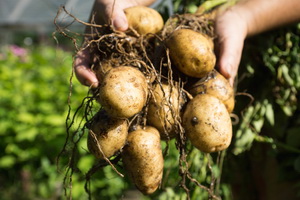
CRISPR Removes Bitter Compound in Potato Hairy Roots
August 15, 2018| |
 Most tissues in potato (Solanum tuberosum) accumulate steroidal glycoalkaloids (SGAs) α-solanine and α-chaconine. These molecules confer a bitter taste to humans and are toxic to various organisms. Hence, reducing the SGA content in the tubers is requisite for potato breeding. Previous studies suggested that silencing several SGA synthetic genes leads to a decrease in SGAs.
Most tissues in potato (Solanum tuberosum) accumulate steroidal glycoalkaloids (SGAs) α-solanine and α-chaconine. These molecules confer a bitter taste to humans and are toxic to various organisms. Hence, reducing the SGA content in the tubers is requisite for potato breeding. Previous studies suggested that silencing several SGA synthetic genes leads to a decrease in SGAs.
Masaru Nakayasu, a scientist from Kobe University in Japan, led a team of Japanese researchers in knocking out St16DOX, a vital gene in SGA synthesis, in hopes of completely turning off SGA accumulation in potato hairy roots. The team used the potato hairy root culture system for the introduction of CRISPR-Cas9 vectors.
Two independent genome-edited potato hairy root lines showed no detectable SGAs but have high levels of the St16DOX protein substrate. Analysis of these two lines revealed successfully-mutated sequences of St16DOX. This experimental system can aid the generation of SGA-free tetraploid potato.
For more information, read the article in Plant Physiology and Biochemistry.
| |
Biotech Updates is a weekly newsletter of ISAAA, a not-for-profit organization. It is distributed for free to over 22,000 subscribers worldwide to inform them about the key developments in biosciences, especially in biotechnology. Your support will help us in our mission to feed the world with knowledge. You can help by donating as little as $10.
-
See more articles:
-
News from Around the World
- Fall Armyworm Expected to Spread from India to Other Parts of Asia
- Ghana Inspired by Nigeria's Bt Cotton Commercialization
- Consistency in Biotech Reporting Vital in Cultivating Public Awareness
- Indigenous Mexican Corn Variety Captures Nitrogen from Air
- Drought Tolerant HB4 Soybeans Introduced in Argentina
- FDA Approves Sugar from Brazil's Bt Sugarcane
- Asian Food Safety Association Conference Tackles Strategies for Food Security
- Scientists Unlock Seed Germination Process
-
Research Highlights
- RNA-based pesticide, an Environmentally Friendly Alternative in Pre- and Post-harvest Plant Protection
- Researchers Study Spatial Distribution and Losses Caused by Corn Ear Pests in Bt and Non-Bt Corn
- Genome-wide Characterization of Stress-response Gene Family in Cotton
- Wheat TaNBP1 Gene Regulates Plant Adaption to Nitrogen Starvation
-
Beyond Crop Biotech
- Production of Genome-Edited Rats Using rGONAD Method
-
Announcements
- 6th Annual South Asia Biosafety Conference
-
Plant
- Researchers Develop CRISPR System for Salsifies
- Camelina Fatty Acid Composition Improved Using CRISPR
- CRISPR Removes Bitter Compound in Potato Hairy Roots
-
Read the latest: - Biotech Updates (February 11, 2026)
- Gene Editing Supplement (January 28, 2026)
- Gene Drive Supplement (February 22, 2023)
-
Subscribe to BU: - Share
- Tweet
